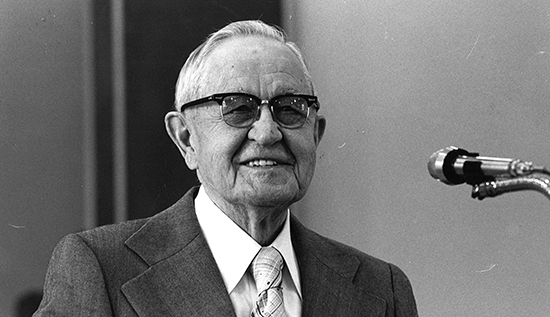
December-January 2016
Follow the Leader
------------------
|






How a Failed College Became a Catalyst for Unity
John Welch and the Free Will Baptist University
By Eric K. Thomsen
From their earliest days—long before the formation of the National Association—Free Will Baptists in both North and South demonstrated great concern for education. A number of historic schools were started and closed, or absorbed by other denominational groups, as was the case after Free Will Baptists merged with Northern Baptists in 1911.[1]
Only three regional Free Will Baptists colleges remained in operation during the second decade of the 20th Century: Ayden Seminary and College, in Ayden, North Carolina;[2] Tecumseh College, in Tecumseh, Oklahoma; and Zion Bible School in Blakely, Georgia. By the time the denomination united in 1935, only Zion Bible School remained in operation.
The lack of a unified Free Will Baptist college had long been a source of frustration. Efforts were made in 1907 by representatives from Georgia, North Carolina, and Tennessee to open The Free Will Baptist University in Nashville. Unfortunately, only one student enrolled, and the new school came to an abrupt end.
Yet, the frustrating attempt was not futile, for that single student, John L. Welch, soon became a major catalyst and spokesman in the push for a Free Will Baptist school. Appointed chairman of an education committee by the Eastern General Conference in 1921, Welch worked tirelessly through the 1920s and 30s to promote a unified Free Will Baptist college within the Eastern General Conference. He also met with representatives from the West (the Cooperative Association) to discuss the need for a school. [3]
In a report to delegates attending the 1933 Eastern General Conference, Welch said, “I have found a strong and growing sentiment among our people for a centralized educational institution.” [4] In a bold move, he recommended that the formation of the institution hinge upon the union of the two conferences: “First, that the question of a centralized educational institution be made contingent upon the merging of the Cooperative General Association and the General Conference into one national body.”
Welch went so far as to recommend a committee of leaders from both groups meet in Nashville to consider the city as a permanent site for the new school. This group became known as the Joint Educational Committee. Thus, the push for a unified Free Will Baptist college became synonymous with and a catalyst for a unified denomination.
Free Will Baptist Bible School, Nashville, Tennessee
When the denomination organized in 1935, the first order of business for the newly elected Education Committee was to recommend Nashville as the location for a “Bible School” to start as early as 1936.[5] Delegates tapped Welch, who had also been elected moderator of the denomination, to serve as the National Secretary of Education, heading a five-member Board of Trustees for a school that did not yet exist. They appointed Selph Jones (Missouri), Henry Melvin (North Carolina), J.C. Griffin (North Carolina), M.F. Vanhoose (Kentucky), and E.A. O’Donnell (Oklahoma) to serve with him on the board.
In the wake of the organizational meeting, plans were delayed, despite the growing concern for a college. Four years later, during the 1939 convention in Bryan, Texas, Welch’s daughter Jean, a 16-year-old high school student, delivered an impassioned address to delegates. According to the minutes, “The challenge and prayer so gripped the hearts of all present that it resulted in a great educational rally such as many had never experienced before.”[6]
During the same meeting, the Education Board shared its own observations regarding the denomination’s need—and great desire—for a college: “There is not only an increasing interest, but a greater demand for Christian Education than we have even seen before. This interest is especially noticeable among the laity of our churches, and particularly among the youth…further delay will not only work a hardship, but will have a tendency to destroy present interest. By our delay, we both deny the privilege of Christian Education to those so much in need of it, and we lose to other denominations the best talent, which might have become our greatest asset of tomorrow.”[7]
In spite of growing educational fervor, three long years passed before the dream finally became reality. In 1941, under the leadership of Executive Secretary L.R. Ennis and Secretary of Education J.R. Davidson, the Education Board purchased a beautiful home at 3609 Richland Avenue for $15,000. They made a down payment of $5,000, and a year later, in October 1942, when the college was dedicated for service, the entire debt had been retired on the property located in the West End area of Nashville.
Free Will Baptist Bible School opened September 15, 1942, with nine students: James Hagin (Georgia); Sam and Rashie Kennedy (North Carolina); Paul Ketteman, Opal Hiltabidal, and George Waggoner (Illinois); Sylvia and Damon Dodd and Marie Thomas (Missouri). Later in the semester, three additional students joined the body: Dan Cronk (Michigan); Chester O’Donnell (Alabama); and Robert Woodard (North Carolina).
The Board of Trustees appointed south Georgia pastor L.C. Johnson as the school’s first president. When initially approached by L.R. Ennis at the 1942 convention in Columbus, Mississippi, the soft-spoken southern gentleman resisted the appointment. But at the urging of his colleagues, Johnson graciously accepted, telling the committee that he could not understand his appointment, but would submit to the spiritual judgment of older, more experienced men who seemed certain about God’s leading.[8]
Johnson quickly proved to be a man of courage and vision, and he carved out a successful educational program—although one far different than expected by most Free Will Baptists. According to Dr. Robert E. Picirilli, chairman of the Free Will Baptist Historical Commission, “While those first leaders thought only in terms of a Bible institute, Dr. Johnson led the new college to a well-rounded program that included both sound biblical content and a generous core of Christian liberal arts.”[9]
Welch, Johnson, and countless other Free Will Baptists passionate about the cause of Christian education laid the college foundation well. Nearly 75 years and two name changes later, Welch College continues to thrive. And more than a century after John L. Welch became the sole student of the “failed” Free Will Baptist University, the college that became his namesake continues to be a unifying agent in the denomination, producing decades of pastors, missionaries, teachers, businessmen and businesswomen, and more dedicated—as the college mission states— to serving Christ, His Church, and His world through biblical thought and life.
About the Writer: Eric K. Thomsen is managing editor of ONE Magazine. He is a member of the Free Will Baptist Historical Commission and president-elect of the Evangelical Press Association. Reprinted by permission from Helwys Society Forum.
____________________
[1] Free Will Baptists in the north, also known as the Randall Movement or Randallites, merged with Northern Baptists in 1911. As a result, Free Will Baptists lost three grade schools: New Hampton Literary Institution, Maine Central Institute, and the Manning Bible School. The denomination also lost a number of colleges: Bates (Maine), Hillsdale (Michigan), Keuka (New York), Rio Grande College (Ohio), Storer College (West Virginia); and two theological seminaries: Cobb Divinity School (Maine) and the theological department at Hillsdale College.
[2] The General Conference of the Original Free Will Baptists formed Ayden Seminary in 1898. In 1926, the seminary was renamed Eureka College and began offering a two-year college program. The college was short-lived, closing two years later due to budgetary restraints.
[3] “Story of a College: Free Will Baptist Bible College,” The Fifty-Year Record of the National Association of Free Will Baptists, 1935-1985, Free Will Baptist Historical Commission, Dr. Mary Wisehart, editor. Randall House Publications, 1988, pages 34-36.
[4] Minutes of the Thirteenth Annual Session of the General Conference of the Original Free Will Baptists of the United States, Ayden Press, Ayden, North Carolina, 1933: http://www.onemag.org/general/general_southeast1933.pdf. Pages 13-14.
[5] Minutes of the First Session of the National Association of Original Free Will Baptists, Ayden Press, Ayden, North Carolina, 1935: http://fwbhistory.com/wp-content/uploads/2013/03/1935.pdf. Pages 7-8.
[6] Minutes of the Third Session of the National Association of Original Free Will Baptists, The Morning Herald Press, Clinchco, Virginia, 1939: http://fwbhistory.com/wp-content/uploads/2013/03/1939.pdf. Page 3.
[7] Ibid, page 13.
[8] From the chapel address, “A Tribute to L. C. Johnson.” The September 2002 issue of Contact magazine records further comments from Johnson during a 1978 interview: “I was dumbfounded when L.R. Ennis told me the news. It was a very emotional time for me. In September 1942 I came to Nashville and found an empty building with our first student, Paul Ketteman, standing on the front doorsteps looking toward Illinois.” http://www.onemag.org/contact/0209Sept.pdf
[9] From a video interview for “Honoring Our Heritage,” the 2012 documentary produced by the Executive Office to mark the 75th anniversary of the National Association of Free Will Baptists.
|
|

